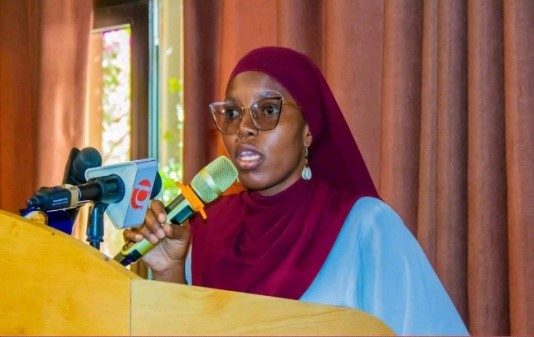By Assan Bah
Isatou Keita, President of the Gambia Press Union (GPU), has called for a collective commitment to raising the standards of journalism in The Gambia, as the country joined the rest of the world to commemorate World Press Freedom Day under the local theme “Media Freedom and Responsibility.” The occasion, which brought together journalists, media stakeholders, civil society representatives and government officials, served as a moment of reflection on the state of press freedom, media ethics, and the role of the press in strengthening democracy.
Speaking during the commemoration, Ms. Keita said that while The Gambia continues to make progress in safeguarding media freedom, there remain critical challenges that threaten the integrity and professionalism of journalism in the country. She emphasized the importance of journalists not only enjoying the constitutional right to report freely but also exercising that right with a sense of responsibility, ethical conduct, and accountability to the public.
“Freedom and responsibility must go hand in hand. A free press must also be fair, accurate and principled,” Keita said. She underscored the worrying trend of declining editorial standards, including the growing politicization of editorial content and the rise of sensationalism, which she said are eroding public trust in the media.
“There is a noticeable low standard of journalism practice in some quarters within the media sector of the country, with some media houses increasingly leaning to one side of the political divide editorially, which generally affects the fundamental journalistic principles of impartiality,” she said. Ms. Keita noted that the growing preference for speed and virality over accuracy and depth has led to the publication of exaggerated stories, misinformation, and unverified claims, compromising the credibility of journalists and their institutions.
She also expressed concern over the frequent use of plagiarized content without proper attribution, the blending of opinion in news reporting, and recurring grammatical and factual errors in published stories—issues she attributed to weak editorial oversight and capacity gaps in many newsrooms.
“These issues reflect the urgent need for better training, editorial discipline, and institutional commitment to excellence,” she said. She urged media proprietors and editors to invest in professional development, maintain strong editorial policies, and ensure that journalists are well-compensated and contractually protected.
“Hire those who can do the job and pay them well to maintain them,” Keita added, stressing that the sustainability of a free and credible press hinges on professional integrity, decent working conditions, and institutional accountability.
She concluded by calling on all stakeholders—media owners, journalists, regulators, and civil society—to recommit to the values of ethical journalism and to work together in restoring high standards and public trust in the media. As the GPU marks World Press Freedom Day, the message from its leadership is clear: press freedom is not just a right, but a responsibility—one that must be upheld through professionalism, fairness, and unwavering adherence to truth.


















